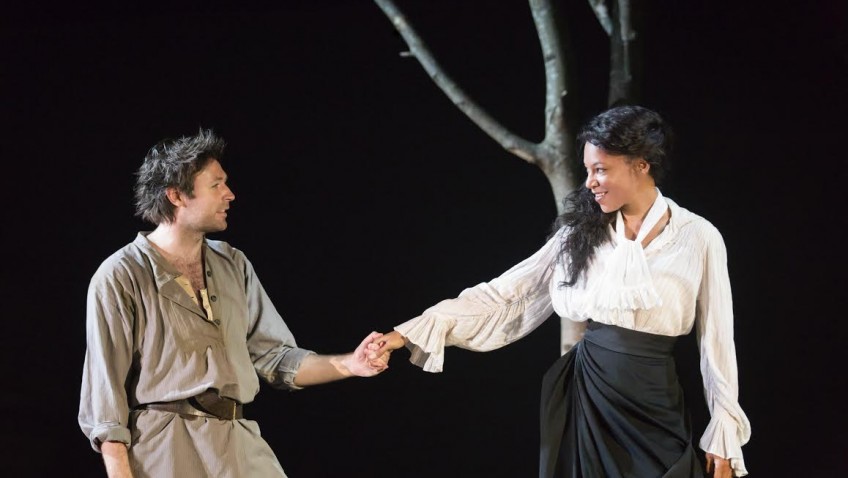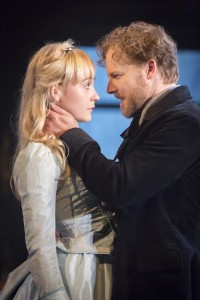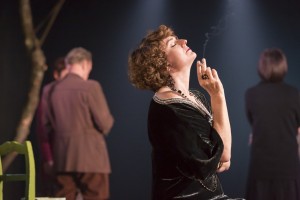Robert Tanitch reviews Young Chekhov at Chichester Festival Theatre, West Sussex
“In life,” Anton Chekhov said, “everything is mixed up: the profound with the trite, the tragic with the comic.” It is this knife-edge between laughter and tears, which make his plays so popular with actors, directors and audiences.
 Young Chekhov features three plays by Chekhov in repertoire: the rarely performed Platonov and Ivanov and the much better-known, The Seagull, directed by Jonathan Kent, famed for his productions of Chekhov, and who has engaged a fine ensemble.
Young Chekhov features three plays by Chekhov in repertoire: the rarely performed Platonov and Ivanov and the much better-known, The Seagull, directed by Jonathan Kent, famed for his productions of Chekhov, and who has engaged a fine ensemble.
I wish The Wood-Demon, (the first draft for Uncle Vanya) had been acted instead of The Seagull, if only because it is so rarely performed.
But that would defeat the translator David Hare’s purpose which is to show the way Chekhov develops from 19th century broad caricature to the beginnings of 20th century subtlety and realism.
 Chekhov paints a large canvas to produce a portrait of a provincial society in Russia in the 1880s, which in the first two plays at least is amoral, corrupt, self-destructive, anti-Semitic and barbaric. A thief is lynched by a mob off-stage.
Chekhov paints a large canvas to produce a portrait of a provincial society in Russia in the 1880s, which in the first two plays at least is amoral, corrupt, self-destructive, anti-Semitic and barbaric. A thief is lynched by a mob off-stage.
PLATONOV is a wild, unwieldy, sprawling, a mixture of tragedy, comedy, crude melodrama and farce, which he wrote in 1881 when he was just 21. It was not discovered until 1920 and not acted in Russia until 1960. The play which lasts six hours has been abridged to two and half hours.
Platonov, the least known of the three plays, makes the most impact because of James McArdle’s charismatic performance in the title role. He is immensely likable and very funny as a 30-year-old married schoolteacher, a weak-willed wastrel, who rails against a bourgeois mediocrity and cannot forgive himself for wasting his life. Women find him irresistible and throw themselves at him.
IVANOV dates from 1887 but was rewritten and scored a success in 1889. Ivanov (Samuel West) is a disenchanted bourgeois intellectual, a typical Russian character of the period but given a new spin by Chekhov who wanted to get way from the stereotypical “superfluous man.”
He is deeply aware of his futility and blames himself for his clinical depression. His estate is in ruins and he has no money to pay bills, debts and workers. He no longer loves his consumptive wife (Nina Sonaya) who gave up family and religion for him. The most shocking moment is when he calls her “a dirty Jew” and says he longs for her to die.
The funniest is when the impoverished count (Peter Egan squawking like a hawk) dithers about marrying a very rich and very vulgar woman (Emma Amos) for her money. The wedding day with two brides finding themselves husbndless and everybody in tears might be a comic scene out of Gogol or Ostrovky.
There are fine performances by Olivia Vinall as the bride, by Jonathan Coy as her father and by McArdle as the self-righteous doctor who takes the high moral position and regularly harangues Ivanov.
THE SEAGULL premiered in 1896 but was not a success until restaged in1898. All the characters are unhappy and dissatisfied with their dreary, unfulfilled lives. Everybody is in love with the wrong person.
Konstantin (Joshua James) a young writer, loves Nina (Olivia Vinall), a stage-struck girl, who loves Trigorin (Samuel West), a famous writer, who is loved by Arkadina (Anna Chancellor), Konstantin’s mother, a famous actress. The high spot is Arkadina degrading herself before Trigorin .
You can see the plays separately and in any order or all on one day, a rewarding marathon, for actors and audience alike, starting at 10.30 in the morning. Should you decide to see only one play, which would be a pity, I would recommend Platonov and that would be because of McArdle’s performance.
To learn more about Robert Tanitch and his reviews, click here to go to his website






